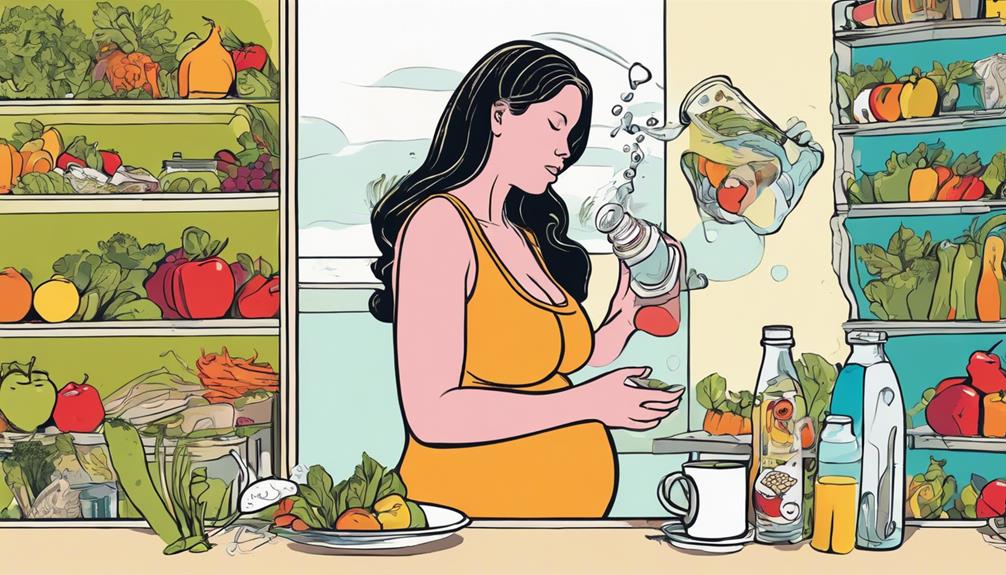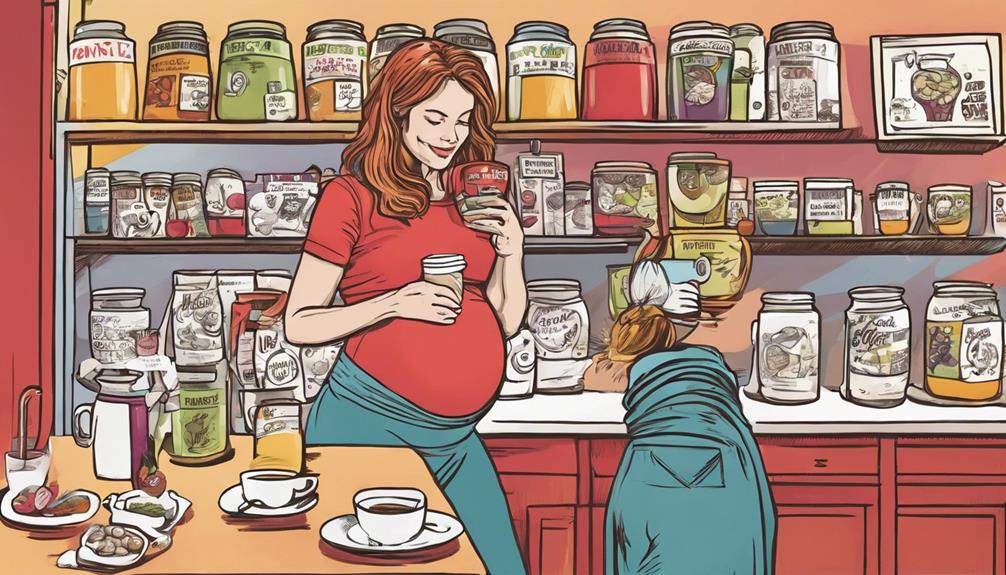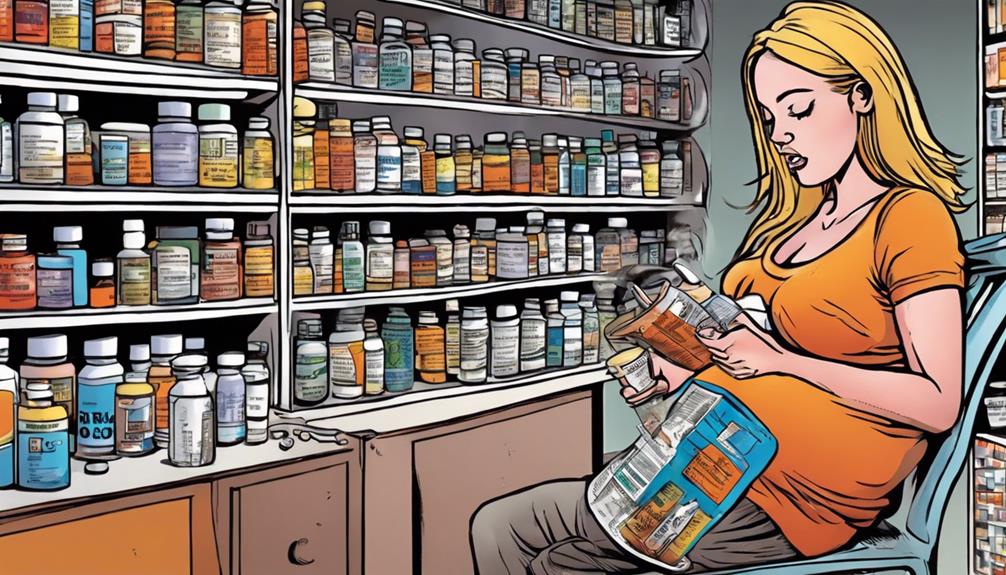During pregnancy, it is important to limit caffeine intake to 200mg per day to avoid coffee. Be cautious of hidden caffeine in tea, soda, and chocolate. Consider switching to herbal teas or decaf alternatives instead. Stay hydrated with water or fruit-infused beverages. Gradually reduce caffeine consumption to minimize withdrawal symptoms. Consuming excessive caffeine can result in complications that impact the health of both you and your baby.
Key Takeaways
- Opt for decaf coffee or herbal teas as caffeine substitutes.
- Stay hydrated with water or fruit-infused beverages.
- Gradually reduce caffeine intake to avoid withdrawal symptoms.
- Read labels to identify hidden sources of caffeine in products.
- Seek professional advice on managing caffeine intake during pregnancy.
Risks of Excessive Caffeine Consumption
Excessive coffee intake during pregnancy heightens the risk of complications such as miscarriage and low birth weight. Pregnant women may experience heightened sensitivity to caffeine, making it vital to be cautious with consumption.
The potential risks associated with high coffee intake go beyond just pregnancy symptoms like insomnia and morning sickness; they extend to fetal development as well. Studies have shown that excessive coffee consumption during pregnancy can have adverse effects on the developing baby.
Limiting coffee intake is vital to mitigate these risks and ensure a healthier pregnancy. By being mindful of your coffee consumption and opting for decaffeinated alternatives, you can greatly reduce the chances of complications like miscarriage and low birth weight.
It's crucial to prioritize the well-being of both you and your baby by making informed choices about your coffee intake during this critical time.
Safe Caffeine Intake Guidelines

To secure a healthy pregnancy, pregnant women should adhere to safe caffeine intake guidelines of limiting their daily consumption to 200mg. Exceeding this limit can pose risks of complications such as miscarriage and low birth weight, impacting both maternal and fetal health. Monitoring caffeine sources is vital, as it hides in various products like tea, soda, and chocolate. Below is a table outlining the recommended limits for safe caffeine intake during pregnancy.
| Caffeine Source | Approximate Caffeine Content (mg) |
|---|---|
| Coffee | 95-165 |
| Tea (8 oz) | 14-70 |
| Soda (12 oz) | 30-55 |
| Energy Drinks | 70-200 |
| Chocolate (1 oz) | 12 |
Alternatives to Caffeine During Pregnancy

Consider swapping out your regular coffee for herbal teas, decaf beverages, or other non-caffeinated alternatives to reduce your caffeine intake during pregnancy.
Decaffeinated beverages like coffee and tea can provide a similar taste experience without the caffeine content. Opt for decaf versions of your favorite drinks to still enjoy the flavors you love while expecting.
Stay hydrated with water, infused with fruits like lemon for added flavor, or sparkling water for a revitalizing twist. Milk is another excellent choice to keep you hydrated and provide essential nutrients.
Experiment with different options like smoothies packed with fruits, or fresh fruit juices for a natural energy boost. By exploring these alternatives to caffeine, you can find delicious and satisfying ways to stay energized throughout your pregnancy without relying on coffee.
Effects of Caffeine on Fetal Development

When pregnant, remember that caffeine can pass through the placenta to affect your baby's growth and development.
High caffeine intake has been linked to potential risks like low birth weight, so it's important to be mindful of your consumption.
Even moderate amounts of caffeine can have an impact on fetal growth and stress hormones, highlighting the need to limit your intake during pregnancy.
Fetal Growth and Caffeine
During pregnancy, caffeine consumption directly impacts fetal growth and development by crossing the placenta and influencing the baby's metabolism and sleep patterns. It is crucial to limit caffeine intake as high consumption during pregnancy may lead to complications such as low birth weight, posing potential risks to the baby's well-being. Studies have shown conflicting results regarding the effects of moderate caffeine consumption on fetal growth, emphasizing the importance of being cautious with maternal caffeine intake during pregnancy.
—
| Caffeine Intake | Fetal Growth | Potential Risks |
|---|---|---|
| High consumption | May lead to low birth weight | Increased pregnancy complications |
| Moderate consumption | Effects not conclusive | Possible risks |
| Limiting intake | Important for baby's well-being | Reduce risks |
Developmental Impact of Caffeine
Exploring the developmental impact of caffeine on fetal growth and health reveals significant implications for pregnant individuals. When consuming too much caffeine during pregnancy, it can pose risks to the baby's development.
Here are three essential points to keep in mind:
- Risk of Pregnancy Loss: High caffeine intake has been associated with an increased risk of pregnancy loss. Limiting the amount of caffeine you consume can help mitigate this risk and support a healthy pregnancy.
- Impact on Birth Weights: Studies suggest that excessive caffeine consumption during pregnancy may lead to lower birth weights in babies. Opting for a small amount of caffeine or choosing decaffeinated options can be a safer choice for your baby's growth.
- Importance of Monitoring: Monitoring your sources of caffeine and adhering to safe limits is crucial for fetal development. Being mindful of your caffeine intake can help safeguard against potential adverse effects on your baby's health. Remember, a little caution goes a long way in ensuring a healthy pregnancy.
Caffeine in Foods and Drinks

You should be aware that caffeine is present in various foods and drinks, not just in coffee.
It's important to explore alternative options that are caffeine-free when you're pregnant.
Understanding the caffeine content in different products can help you make safer choices for you and your baby.
Caffeine Content Overview
Various food and drink items, such as coffee, tea, chocolate, cola, and energy drinks, serve as common sources of caffeine. It's not just the usual suspects; even medications like cough syrups and slimming aids can contain caffeine.
To guarantee consumers are aware of the caffeine content in products, clear labeling of caffeine-containing items is mandatory. This transparency helps individuals, especially those like pregnant women who need to monitor their intake levels carefully. When checking labels, remember that caffeine must be listed as an ingredient on products.
Being cautious with your caffeine consumption from various sources is essential, especially during pregnancy. Here are three key sources to watch out for:
- Coffee: A popular morning pick-me-up that contains a significant amount of caffeine.
- Tea: Although generally lower in caffeine than coffee, still a notable source.
- Energy Drinks: Often packed with caffeine to provide that extra boost, but should be consumed in moderation.
Safe Alternatives Considered
Consider switching to decaffeinated options like tea or coffee as safe alternatives to reduce caffeine intake during pregnancy. Decaffeinated tea provides a soothing and comforting option without the stimulating effects of caffeine.
Herbal teas, such as chamomile or ginger tea, can also be delightful choices to satisfy your beverage cravings. Opt for invigorating alternatives like water with a splash of lemon or natural fruit juices to stay hydrated and energized without the caffeine boost.
Be mindful of hidden sources of caffeine in foods, medications, and energy drinks, as they can contribute to your overall intake. Check product labels to be aware of the caffeine content and make informed decisions.
If you're used to consuming high amounts of caffeine, gradually reduce your intake to minimize withdrawal symptoms and facilitate a smooth change to these safer alternatives. By making these simple swaps, you can still enjoy your favorite beverages while safeguarding your pregnancy.
Caffeine in Medications

Medications such as cough syrups and slimming aids often contain caffeine, which can be concerning during pregnancy. Here are some key facts to keep in mind:
- Caffeine in Various Medications:
Caffeine is commonly found in cough, cold, headache, and slimming medications. It's important to be mindful of this when selecting medication during pregnancy.
- Seeking Professional Advice:
Before taking any medication while pregnant or breastfeeding, it's essential to seek advice from a doctor or pharmacist. They can provide guidance on suitable alternatives or safe usage.
- Checking Labels:
Always inspect the labels of herbal products and medications for their caffeine content. This simple step can help you avoid unnecessary caffeine intake, particularly when dealing with cold and flu remedies.
Being aware of the caffeine content in medications is crucial for managing your intake during pregnancy. Prioritizing your health and seeking guidance from healthcare professionals can help you make informed decisions for you and your baby's well-being.
Managing Caffeine Intake Safely

When managing your caffeine intake during pregnancy, it's important to limit your daily consumption to 200mg to minimize potential risks.
To stay safe during pregnancy, monitor sources of caffeine in foods, drinks, and medications carefully.
Gradually reducing your caffeine intake can help manage withdrawal symptoms effectively.
Opt for decaffeinated options such as herbal teas, water, or fruit juice as alternatives to coffee.
If you need more guidance on managing your caffeine intake during pregnancy, consult a healthcare provider for personalized advice.
Remember, staying within safe limits is essential for the health of both you and your baby.
Impact of Caffeine on Pregnancy Symptoms

Excessive caffeine consumption during pregnancy can worsen common symptoms such as nausea, heartburn, and insomnia.
Here's how caffeine impacts pregnancy symptoms:
- Increased Heart Rate and Blood Pressure: High caffeine intake can lead to elevated heart rate and blood pressure, potentially putting strain on the mother and the developing baby.
- Impact on Iron Absorption: Caffeine may interfere with iron absorption, an essential nutrient during pregnancy. This interference could have repercussions on maternal and fetal health.
- Contribution to Insomnia and Dehydration: Excess caffeine can disrupt sleep patterns, exacerbating insomnia. Moreover, it acts as a diuretic, contributing to dehydration, which is particularly concerning during pregnancy.
Being mindful of your caffeine intake can help manage these symptoms effectively and promote a healthier pregnancy.
Consider reducing your consumption and opting for caffeine-free alternatives to support your well-being and that of your baby.
Professional Guidance on Caffeine During Pregnancy

To receive expert advice on managing your caffeine intake during pregnancy, it's recommended to seek guidance from healthcare professionals such as your doctor or midwife. Healthcare providers emphasize the importance of limiting caffeine consumption during pregnancy to 200mg per day. Consulting with your healthcare provider for personalized advice on caffeine intake is essential for maternal and fetal health.
High caffeine intake during pregnancy has been linked to complications like miscarriage and low birth weight, underscoring the necessity of monitoring caffeine sources and adhering to safe intake levels. Professional guidance can help you navigate the complexities of caffeine consumption in pregnancy, ensuring that you make informed choices for a healthy pregnancy.
Frequently Asked Questions
How Can I Stop Drinking Coffee During Pregnancy?
To stop drinking coffee during pregnancy, start by switching to decaf gradually. Try herbal teas or fruit-infused water instead. Keep track of your caffeine intake, stay hydrated, and eat a balanced diet. Seek help from healthcare providers for personalized advice.
What Are the Rules for Coffee During Pregnancy?
Limit coffee to 200mg of caffeine daily during pregnancy. Excessive caffeine raises risks for complications, affecting baby's metabolism and sleep. Be mindful of hidden caffeine in foods and meds. Seek personalized advice from a healthcare provider.
What Should I Drink Instead of Coffee When Pregnant?
When pregnant, opt for decaffeinated tea, herbal options like chamomile, peppermint, or ginger, infused water with fruits, smoothies, fresh juices, warm milk with honey, or hot cocoa made with unsweetened cocoa powder as delicious caffeine-free alternatives to coffee.
How Can I Wake up Without Coffee During Pregnancy?
Want to wake up without coffee during pregnancy? Start your day with a nutritious breakfast, stay hydrated with water or herbal teas, exercise regularly, take power naps, and practice deep breathing or mindfulness for a natural energy boost.
Conclusion
As you navigate your pregnancy journey, remember that skipping that extra cup of coffee is a small sacrifice for the health and well-being of your little one.
Imagine your baby growing and developing in a caffeine-free environment, thriving and flourishing without any unnecessary risks.
Trust in your ability to make the best choices for your baby, starting with avoiding coffee during pregnancy. Trusting in your ability to make the best choices for your baby also means taking care of yourself during pregnancy. This includes avoiding consuming coffee, as it contains caffeine which can affect the baby’s development. Additionally, you can explore alternatives such as herbal teas or decaffeinated coffee. If you’re worried about giving up your morning coffee, you can consider consulting with a dentist on how to prevent coffee stains on teeth while still caring for your oral health during pregnancy. Taking care of your oral health is just as important as taking care of your overall health during pregnancy. Consulting with a dentist on how to prevent coffee stains on teeth can help you maintain a healthy smile while making the best choices for your baby. Remember that trusting in your ability to make the best choices for your baby includes taking care of yourself in every way possible, and that includes making adjustments to your daily habits such as avoiding coffee and learning how to avoid coffee stains. Perfecting the sweetness of coffee can be achieved by exploring alternative sweeteners such as honey or agave nectar, which can still satisfy your cravings while avoiding the negative effects of consuming too much sugar during pregnancy. And remember, making the best choices for your baby also means seeking support and guidance from healthcare professionals, including your dentist, to ensure that you are taking the best care of yourself and your baby. Trust in your ability to prioritize your health and well-being, and remember that making adjustments to your habits, such as avoiding coffee, is a small sacrifice to ensure the best start for your little one.
Your baby will thank you for it in the long run.









